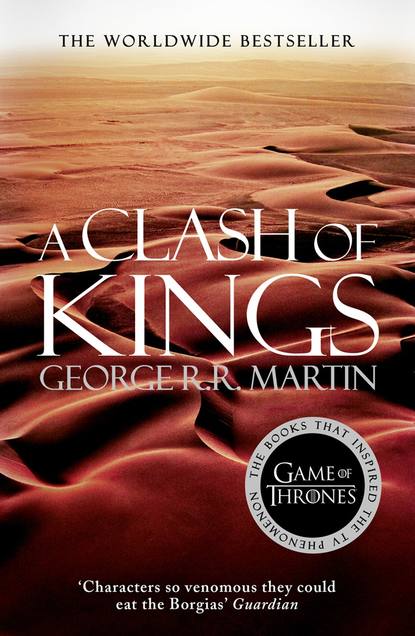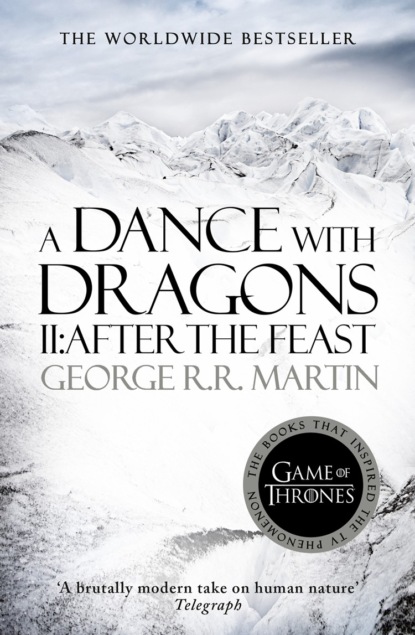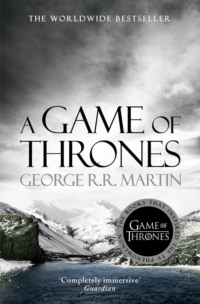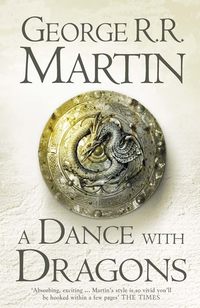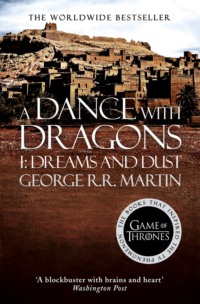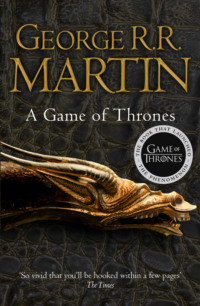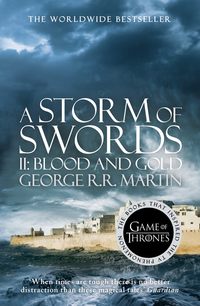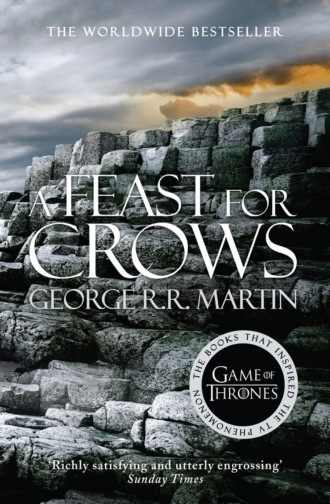
Полная версия
A Feast for Crows
Ser Osmund had been joined by his brothers Osney and Osfryd. “There is a dead woman in the Hand’s bedchamber,” Cersei told the three Kettleblacks. “No one is ever to know that she was here.”
“Aye, m’lady.” Ser Osney had faint scratches on his cheek where another of Tyrion’s whores had clawed him. “And what shall we do with her?”
“Feed her to your dogs. Keep her for a bedmate. What do I care? She was never here. I’ll have the tongue of any man who dares to say she was. Do you understand me?”
Osney and Osfryd exchanged a look. “Aye, Your Grace.”
She followed them back inside and watched as they bundled the girl up in her father’s bloody blankets. Shae, her name was Shae. They had last spoken the night before the dwarf’s trial by combat, after that smiling Dornish snake offered to champion him. Shae had been asking about some jewels Tyrion had given her, and certain promises Cersei might have made, a manse in the city and a knight to marry her. The queen made it plain that the whore would have nothing of her until she told them where Sansa Stark had gone. “You were her maid. Do you expect me to believe that you knew nothing of her plans?” she had said. Shae left in tears.
Ser Osfryd slung the bundled corpse up over his shoulder. “I want that chain,” Cersei said. “See that you do not scratch the gold.” Osfryd nodded and started toward the door. “No, not through the yard.” She gestured toward the secret passage. “There’s a shaft down to the dungeons. That way.”
As Ser Osfryd went down on one knee before the hearth, the light brightened within, and the queen heard noises. Jaime emerged bent over like an old woman, his boots kicking up puffs of soot from Lord Tywin’s last fire. “Get out of my way,” he told the Kettleblacks.
Cersei rushed toward him. “Did you find them? Did you find the killers? How many were there?” Surely there had been more than one. One man alone could not have killed her father.
Her twin’s face had a haggard look. “The shaft goes down to a chamber where half a dozen tunnels meet. They’re closed off by iron gates, chained and locked. I need to find keys.” He glanced around the bedchamber. “Whoever did this might still be lurking in the walls. It’s a maze back there, and dark.”
She imagined Tyrion creeping between the walls like some monstrous rat. No. You are being silly. The dwarf is in his cell. “Take hammers to the walls. Knock this tower down, if you must. I want them found. Whoever did this. I want them killed.”
Jaime hugged her, his good hand pressing against the small of her back. He smelled of ash, but the morning sun was in his hair, giving it a golden glow. She wanted to draw his face to hers for a kiss. Later, she told herself, later he will come to me, for comfort. “We are his heirs, Jaime,” she whispered. “It will be up to us to finish his work. You must take Father’s place as Hand. You see that now, surely. Tommen will need you …”
He pushed away from her and raised his arm, forcing his stump into her face. “A Hand without a hand? A bad jape, sister. Don’t ask me to rule.”
Their uncle heard the rebuff. Qyburn as well, and the Kettleblacks, wrestling their bundle through the ashes. Even the guardsmen heard, Puckens and Hoke the Horseleg and Shortear. It will be all over the castle by nightfall. Cersei felt the heat rising up her cheeks. “Rule? I said naught of ruling. I shall rule until my son comes of age.”
“I don’t know who I pity more,” her brother said. “Tommen, or the Seven Kingdoms.”
She slapped him. Jaime’s arm rose to catch the blow, cat-quick … but this cat had a cripple’s stump in place of a right hand. Her fingers left red marks on his cheek.
The sound brought their uncle to his feet. “Your father lies here dead. Have the decency to take your quarrel outside.”
Jaime inclined his head in apology. “Forgive us, Uncle. My sister is sick with grief. She forgets herself.”
She wanted to slap him again for that. I must have been mad to think he could be Hand. She would sooner abolish the office. When had a Hand ever brought her anything but grief? Jon Arryn put Robert Baratheon in her bed, and before he died he’d begun sniffing about her and Jaime as well. Eddard Stark took up right where Arryn had left off; his meddling had forced her to rid herself of Robert sooner than she would have liked, before she could deal with his pestilential brothers. Tyrion sold Myrcella to the Dornishmen, made one of her sons his hostage, and murdered the other. And when Lord Tywin returned to King’s Landing …
The next Hand will know his place, she promised herself. It would have to be Ser Kevan. Her uncle was tireless, prudent, unfailingly obedient. She could rely on him, as her father had. The hand does not argue with the head. She had a realm to rule, but she would need new men to help her rule it. Pycelle was a doddering lickspittle, Jaime had lost his courage with his sword hand, and Mace Tyrell and his cronies Redwyne and Rowan could not be trusted. For all she knew they might have had a part in this. Lord Tyrell had to know that he would never rule the Seven Kingdoms so long as Tywin Lannister lived.
I will need to move carefully with that one. The city was full of his men, and he’d even managed to plant one of his sons in the Kingsguard, and meant to plant his daughter in Tommen’s bed. It still made her furious to think that Father had agreed to betroth Tommen to Margaery Tyrell. The girl is twice his age and twice widowed. Mace Tyrell claimed his daughter was still virgin, but Cersei had her doubts. Joffrey had been murdered before he could bed the girl, but she had been wed to Renly first … A man may prefer the taste of hippocras, yet if you set a tankard of ale before him, he will quaff it quick enough. She must command Lord Varys to find out what he could.
That stopped her where she stood. She had forgotten about Varys. He should be here. He is always here. Whenever anything of import happened in the Red Keep, the eunuch appeared as if from nowhere. Jaime is here, and Uncle Kevan, and Pycelle has come and gone, but not Varys. A cold finger touched her spine. He was part of this. He must have feared that Father meant to have his head, so he struck first. Lord Tywin had never had any love for the simpering master of whisperers. And if any man knew the Red Keep’s secrets, it was surely the master of whisperers. He must have made common cause with Lord Stannis. They served together on Robert’s council, after all …
Cersei strode to the door of the bedchamber, to Ser Meryn Trant. “Trant, bring me Lord Varys. Squealing and squirming if need be, but unharmed.”
“As Your Grace commands.”
But no sooner had one Kingsguard departed than another one returned. Ser Boros Blount was red-faced and puffing from his headlong rush up the steps. “Gone,” he panted, when he saw the queen. He sank to one knee. “The Imp … his cell’s open, Your Grace … no sign of him anywhere …”
The dream was true. “I gave orders,” she said. “He was to be kept under guard, night and day …”
Blount’s chest was heaving. “One of the gaolers has gone missing too. Rugen, his name was. Two other men we found asleep.”
It was all she could do not to scream. “I hope you did not wake them, Ser Boros. Let them sleep.”
“Sleep?” He looked up, jowly and confused. “Aye, Your Grace. How long shall—”
“Forever. See that they sleep forever, ser. I will not suffer guards to sleep on watch.” He is in the walls. He killed Father as he killed Mother, as he killed Joff. The dwarf would come for her as well, the queen knew, just as the old woman had promised her in the dimness of that tent. I laughed in her face, but she had powers. I saw my future in a drop of blood. My doom. Her legs were weak as water. Ser Boros tried to take her by the arm, but the queen recoiled from his touch. For all she knew he might be one of Tyrion’s creatures. “Get away from me,” she said. “Get away!” She staggered to a settle.
“Your Grace?” said Blount. “Shall I fetch a cup of water?”
It is blood I need, not water. Tyrion’s blood, the blood of the valonqar. The torches spun around her. Cersei closed her eyes, and saw the dwarf grinning at her. No, she thought, no, I was almost rid of you. But his fingers had closed around her neck, and she could feel them beginning to tighten.
BRIENNE
“I am looking for a maid of three-and-ten,” she told the grey-haired goodwife beside the village well. “A highborn maid and very beautiful, with blue eyes and auburn hair. She may have been traveling with a portly knight of forty years, or perhaps with a fool. Have you seen her?”
“Not as I recall, ser,” the goodwife said, knuckling her forehead. “But I’ll keep my eye out, that I will.”
The blacksmith had not seen her either, nor the septon in the village sept, the swineherd with his pigs, the girl pulling up onions from her garden, nor any of the other simple folk that the Maid of Tarth found amongst the daub-and-wattle huts of Rosby. Still, she persisted. This is the shortest road to Duskendale, Brienne told herself. If Sansa came this way, someone must have seen her. At the castle gates she posed her question to two spearmen whose badges showed three red chevronels on ermine, the arms of House Rosby. “If she’s on the roads these days she won’t be no maid for long,” said the older man. The younger wanted to know if the girl had that auburn hair between her legs as well.
I will find no help here. As Brienne mounted up again, she glimpsed a skinny boy atop a piebald horse at the far end of the village. I have not talked with that one, she thought, but he vanished behind the sept before she could seek him out. She did not trouble to chase after him. Most like he knew no more than the others had. Rosby was scarce more than a wide place in the road; Sansa would have had no reason to linger here. Returning to the road, Brienne headed north and east past apple orchards and fields of barley, and soon left the village and its castle well behind. It was at Duskendale that she would find her quarry, she told herself. If she came this way at all.
“I will find the girl and keep her safe,” Brienne had promised Ser Jaime, back at King’s Landing. “For her lady mother’s sake. And for yours.” Noble words, but words were easy. Deeds were hard. She had lingered too long and learned too little in the city. I should have set out earlier … but to where? Sansa Stark had vanished on the night King Joffrey died, and if anyone had seen her since, or had any inkling where she might have gone, they were not talking. Not to me, at least.
Brienne believed the girl had left the city. If she were still in King’s Landing, the gold cloaks would have turned her up. She had to have gone elsewhere … but elsewhere is a big place. If I were a maiden newly flowered, alone and afraid, in desperate danger, what would I do? she had asked herself. Where would I go? For her, the answer came easy. She would make her way back to Tarth, to her father. Sansa’s father had been beheaded whilst she watched, however. Her lady mother was dead too, murdered at the Twins, and Winterfell, the great Stark stronghold, had been sacked and burned, its people put to the sword. She has no home to run to, no father, no mother, no brothers. She might be in the next town, or on a ship to Asshai; one seemed as likely as the other.
Even if Sansa Stark had wanted to go home, how would she get there? The kingsroad was not safe; even a child would know that. The ironborn held Moat Cailin athwart the Neck, and at the Twins sat the Freys, who had murdered Sansa’s brother and lady mother. The girl could go by sea if she had the coin, but the harbor at King’s Landing was still in ruins, the river a jumble of broken quays and burned and sunken galleys. Brienne had asked along the docks, but no one could remember a ship leaving on the night King Joffrey died. A few trading ships were anchoring in the bay and off-loading by boat, one man told her, but more were continuing up the coast to Duskendale, where the port was busier than ever.
Brienne’s mare was sweet to look upon and kept a pretty pace. There were more travelers than she would have thought. Begging brothers trundled by with their bowls dangling on thongs about their necks. A young septon galloped past upon a palfrey as fine as any lord’s, and later she met a band of silent sisters who shook their heads when Brienne put her question to them. A train of oxcarts lumbered south with grain and sacks of wool, and later she passed a swineherd driving pigs, and an old woman in a horse litter with an escort of mounted guards. She asked all of them if they had seen a highborn girl of three-and-ten years with blue eyes and auburn hair. None had. She asked about the road ahead as well. “’Twixt here and Duskendale is safe enough,” one man told her, “but past Duskendale there’s outlaws, and broken men in the woods.”
Only the soldier pines and sentinels still showed green; the broad-leaf trees had donned mantles of russet and gold, or else uncloaked themselves to scratch against the sky with branches brown and bare. Every gust of wind drove swirling clouds of dead leaves across the rutted road. They made a rustling sound as they scuttled past the hooves of the big bay mare that Jaime Lannister had bestowed on her. As easy to find one leaf in the wind as one girl lost in Westeros. She found herself wondering whether Jaime had given her this task as some cruel jape. Perhaps Sansa Stark was dead, beheaded for her part in King Joffrey’s death, buried in some unmarked grave. How better to conceal her murder than by sending some big stupid wench from Tarth to find her?
Jaime would not do that. He was sincere. He gave me the sword, and called it Oathkeeper. Anyway, it made no matter. She had promised Lady Catelyn that she would bring back her daughters, and no promise was as solemn as one sworn to the dead. The younger girl was long dead, Jaime claimed; the Arya the Lannisters sent north to marry Roose Bolton’s bastard was a fraud. That left only Sansa. Brienne had to find her.
Near dusk she saw a campfire burning by a brook. Two men sat beside it grilling trout, their arms and armor stacked beneath a tree. One was old and one was somewhat younger, though far from young. The younger rose to greet her. He had a big belly straining at the laces of his spotted doeskin jerkin. A shaggy untrimmed beard covered his cheeks and chin, the color of old gold. “We have trout enough for three, ser,” he called out.
It was not the first time Brienne had been mistaken for a man. She pulled off her greathelm, letting her hair spill free. It was yellow, the color of dirty straw, and near as brittle. Long and thin, it blew about her shoulders. “I thank you, ser.”
The hedge knight squinted at her so earnestly that she realized he must be nearsighted. “A lady, is it? Armed and armored? Illy, gods be good, the size of her.”
“I took her for a knight as well,” the older knight said, turning the trout.
Had Brienne been a man, she would have been called big; for a woman, she was huge. Freakish was the word she had heard all her life. She was broad in the shoulder and broader in the hips. Her legs were long, her arms thick. Her chest was more muscle than bosom. Her hands were big, her feet enormous. And she was ugly besides, with a freckled, horsey face and teeth that seemed almost too big for her mouth. She did not need to be reminded of any of that. “Sers,” she said, “have you seen a maid of three-and-ten upon the road? She has blue eyes and auburn hair, and may have been in company with a portly red-faced man of forty years.”
The nearsighted hedge knight scratched his head. “I recall no such maid. What sort of hair is auburn?”
“Browny red,” said the older man. “No, we saw her not.”
“We saw her not, m’lady,” the younger told her. “Come, dismount, the fish is almost done. Are you hungry?”
She was, as it happened, but she was wary as well. Hedge knights had an unsavory reputation. “A hedge knight and a robber knight are two sides of the same sword,” it was said. These two do not look too dangerous. “Might I know your names, sers?”
“I have the honor to be Ser Creighton Longbough, of whom the singers sing,” said the big-bellied one. “You will have heard of my deeds on the Blackwater, mayhaps. My companion is Ser Illifer the Penniless.”
If there was a song about Creighton Longbough, it was not one Brienne had heard. Their names meant no more to her than did their arms. Ser Creighton’s green shield showed only a brown chief, and a deep gouge made by some battle-axe. Ser Illifer bore gold and ermine gyronny, though everything about him suggested that painted gold and painted ermine were the only sorts he’d ever known. He was sixty if he was a day, his face pinched and narrow beneath the hood of a patched roughspun mantle. Mail-clad he went, but flecks of rust spotted the iron like freckles. Brienne stood a head taller than either of them, and was better mounted and better armed in the bargain. If I fear the likes of these, I had as well swap my longsword for a pair of knitting needles.
“I thank you, good sers,” she said. “I will gladly share your trout.” Swinging down, Brienne unsaddled her mare and watered her before hobbling her to graze. She stacked her arms and shield and saddlebags beneath an elm. By then the trout was crisply done. Ser Creighton brought her a fish, and she sat cross-legged on the ground to eat it.
“We are bound for Duskendale, m’lady,” Longbough told her, as he pulled apart his own trout with his fingers. “You would do well to ride with us. The roads are perilous.”
Brienne could have told him more about the perils of the roads than he might have cared to know. “I thank you, ser, but I have no need of your protection.”
“I insist. A true knight must defend the gentler sex.”
She touched her sword hilt. “This will defend me, ser.”
“A sword is only as good as the man who wields it.”
“I wield it well enough.”
“As you will. It would not be courteous to argue with a lady. We will see you safe to Duskendale. Three together may ride more safely than one alone.”
We were three when we set out from Riverrun, yet Jaime lost his hand and Cleos Frey his life. “Your mounts could not keep up with mine.” Ser Creighton’s brown gelding was an old swaybacked creature with rheumy eyes, and Ser Illifer’s horse looked weedy and half-starved.
“My steed served me well enough on the Blackwater,” Ser Creighton insisted. “Why, I did great carnage there and won a dozen ransoms. Was m’lady familiar with Ser Herbert Bolling? You shall never meet him now. I slew him where he stood. When swords clash, you shall ne’er find Ser Creighton Longbough to the rear.”
His companion gave a dry chuckle. “Creigh, leave off. The likes o’ her has no need for the likes o’ us.”
“The likes of me?” Brienne was uncertain what he meant.
Ser Illifer crooked a bony finger at her shield. Though its paint was cracked and peeling, the device it bore showed plain: a black bat on a field divided bendwise, silver and gold. “You bear a liar’s shield, to which you have no right. My grandfather’s grandfather helped kill the last o’ Lothston. None since has dared to show that bat, black as the deeds of them that bore it.”
The shield was the one Ser Jaime had taken from the armory at Harrenhal. Brienne had found it in the stables with her mare, along with much else; saddle and bridle, chainmail hauberk and visored greathelm, purses of gold and silver and a parchment more valuable than either. “I lost mine own shield,” she explained.
“A true knight is the only shield a maiden needs,” declared Ser Creighton stoutly.
Ser Illifer paid him no mind. “A barefoot man looks for a boot, a chilly man a cloak. But who would cloak themselves in shame? Lord Lucas bore that bat, the Pander, and Manfryd o’ the Black Hood, his son. Why wear such arms, I ask myself, unless your own sin is fouler still … and fresher.” He unsheathed his dagger, an ugly piece of cheap iron. “A woman freakish big and freakish strong who hides her own true colors. Creigh, behold the Maid o’ Tarth, who opened Renly’s royal throat for him.”
“That is a lie.” Renly Baratheon had been more than a king to her. She had loved him since first he came to Tarth on his leisurely lord’s progress, to mark his coming of age. Her father welcomed him with a feast and commanded her to attend; elsewise she would have hidden in her room like some wounded beast. She had been no older than Sansa, more afraid of sniggers than of swords. They will know about the rose, she told Lord Selwyn, they will laugh at me. But the Evenstar would not relent.
And Renly Baratheon had shown her every courtesy, as if she were a proper maid, and pretty. He even danced with her, and in his arms she’d felt graceful, and her feet had floated across the floor. Later others begged a dance of her, because of his example. From that day forth, she wanted only to be close to Lord Renly, to serve him and protect him. But in the end she failed him. Renly died in my arms, but I did not kill him, she thought, but these hedge knights would never understand. “I would have given my life for King Renly, and died happy,” she said. “I did no harm to him. I swear it by my sword.”
“A knight swears by his sword,” Ser Creighton said.
“Swear it by the Seven,” urged Ser Illifer the Penniless.
“By the Seven, then. I did no harm to King Renly. I swear it by the Mother. May I never know her mercy if I lie. I swear it by the Father, and ask that he might judge me justly. I swear it by the Maiden and Crone, by the Smith and the Warrior. And I swear it by the Stranger, may he take me now if I am false.”
“She swears well, for a maid,” Ser Creighton allowed.
“Aye.” Ser Illifer the Penniless gave a shrug. “Well, if she’s lied, the gods will sort her out.” He slipped his dagger back away. “The first watch is yours.”
As the hedge knights slept, Brienne paced restlessly around the little camp, listening to the crackle of the fire. I should ride on whilst I can. She did not know these men, yet she could not bring herself to leave them undefended. Even in the black of night, there were riders on the road, and noises in the woods that might or might not have been owls and prowling foxes. So Brienne paced, and kept her blade loose in its scabbard.
Her watch was easy, all in all. It was after that was hard, when Ser Illifer woke and said he would relieve her. Brienne spread a blanket on the ground, and curled up to close her eyes. I will not sleep, she told herself, bone weary though she was. She had never slept easily in the presence of men. Even in Lord Renly’s camps, the risk of rape was always there. It was a lesson she had learned beneath the walls of Highgarden, and again when she and Jaime had fallen into the hands of the Brave Companions.
The cold in the earth seeped through Brienne’s blankets to soak into her bones. Before long every muscle felt clenched and cramped, from her jaw down to her toes. She wondered whether Sansa Stark was cold as well, wherever she might be. Lady Catelyn had said that Sansa was a gentle soul who loved lemon cakes, silken gowns, and songs of chivalry, yet the girl had seen her father’s head lopped off and been forced to marry one of his killers afterward. If half the tales were true, the dwarf was the cruelest Lannister of all. If she did poison King Joffrey, the Imp surely forced her hand. She was alone and friendless at that court. In King’s Landing, Brienne had hunted down a certain Brella, who had been one of Sansa’s maids. The woman told her that there was little warmth between Sansa and the dwarf. Perhaps she had been fleeing him as well as Joffrey’s murder.
Whatever dreams Brienne dreamed were gone when dawn awoke her. Her legs were stiff as wood from the cold ground, but no one had molested her, and her goods remained untouched. The hedge knights were up and about. Ser Illifer was cutting up a squirrel for breakfast, while Ser Creighton stood facing a tree, having himself a good long piss. Hedge knights, she thought, old and vain and plump and nearsighted, yet decent men for all that. It cheered her to know that there were still decent men in the world.




